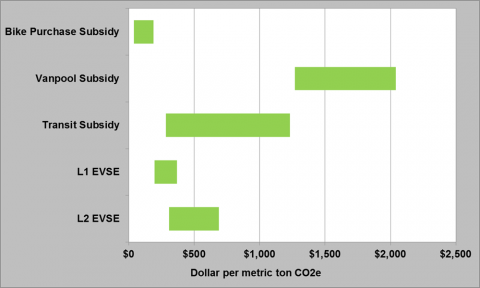Providing workplace charging is one of the more effective ways for businesses to reduce the greenhouse gas emissions of their employees’ daily commute. Offering a bike purchase subsidy can be even more cost effective but may not be suitable for all employees. Transit subsidies may be a good option but there is a wide range of potential costs from $284 to $1,231 per metric ton of carbon dioxide equivalent (CO2e). The vanpool subsidy has the highest cost of the options shown potentially exceeding $2,000 per metric ton of CO2e.
Greenhouse Gas Abatement Costs for Selected Commuting Options
Notes:
L1 EVSE – Level 1 Electric Vehicle Supply Equipment which supplies 120 volts.
L2 EVSE – Level 2 Electric Vehicle Supply Equipment which supplies 240 volts.
CO2e – Carbon dioxide equivalent.
See source for assumptions relating to these calculations.
Supporting Information
| Commuting Options | Low | High |
|---|---|---|
| Bike Purchase Subsidy | $39 | $189 |
| Vanpool Subsidy | $1,270 | $2,040 |
| Transit Subsidy | $284 | $1,231 |
| L1 EVSE | $199 | $369 |
| L2 EVSE | $309 | $688 |
Source: U.S. Department of Energy, Office of Energy Efficiency & Renewable Energy, "Greenhouse Gas Emissions Reduction Benefits of Workplace Charging,", accessed April 15, 2015. | ||


